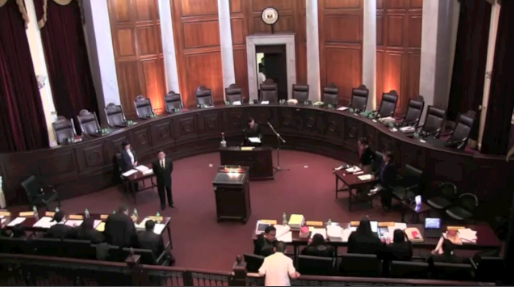 DIVIDED. The High Court is divided over whether internal proceedings can be made public.
DIVIDED. The High Court is divided over whether internal proceedings can be made public.
MANILA, Philippines - Judicial privilege -- just like executive privilege -- is not absolute. Supreme Court (SC) Justices Lourdes Sereno and Antonio Carpio raised this argument as the High Tribunal recently barred magistrates and court personnel from testifying in the impeachment trial against Chief Justice Renato Corona.
The SC, in a resolution dated February 14, said that internal deliberations of the court are considered privileged communication and therefore could not be disclosed to the public. They also barred the release of court records -- which the impeachment court had subpoenaed -- on cases specified in the impeachment complaint against Corona.
Sereno, in a separate opinion, said however that while she agrees with the principle of judicial privilege, this must not be used to invoke a "gag order" upon the members of the highest court of the land. She added that confidentiality must not supersede the need to exact accountability from public officials through an impeachment trial.
"Shall the public’s demand for accountability undertaken by the Impeachment Court through the issuance of subpoenae be severely emasculated by the general claim of keeping internal deliberations of the Court and other documents confidential? I disagree with this idea because unlike judicial privilege that is qualified, the legal mandate to make public officers accountable to the people is absolute and unconditional," she wrote.
Sereno added that the Court has already grappled with the question of which one is more important -- invoking the government's right to privileged communication or allowing the disclosure of confidential information to ascertain if any wrongdoing has been committed? She said some justices have ruled before in the case of Neri v. Senate Committee on Accountability of Public Officers and Investigations that executive privilege -- which is enjoyed by the executive branch -- has its limits.
In the said case, then socieoconomic planning secretary Romulo Neri invoked executive privilege when asked in a Senate investigation about the role of then President Gloria Macapagal-Arroyo in the approval of the now aborted $329-million NBN-ZTE deal. The SC voted 9-6 to uphold Neri's invocation of executive privilege.
Criminal act
One of those who dissented in the said case, Carpio, held a similar opinion with regard to judicial privilege. Carpio wrote that judicial privilege only covers information in relation to how justices decide on a case. If the information concerned already pertains to an illegal act, it should not be kept from the public.
"...Information relating to the commission of crimes or misconduct, or violations of the Code of Judicial Conduct, or any violation of a law or regulation for that matter, is not confidential because the commission of crimes or misconduct is not part of the official functions or duties of Justices," he wrote.
He added that information that also covers the budgetary and administrative concerns of the court should not be considered confidential.
Both Carpio and Sereno voted that the following documents should be released to the impeachment court:
- Date and time of receipt of clerk of court of Sereno's dissenting opinion to the Nov. 22, 2011 resolution of the Court which affirmed the issuance of a temporary restraining order (TRO) enjoining the Department of Justice from enforcing its travel ban against Arroyo. Arroyo sought the TRO after the DOJ barred her and her husband, lawyer Jose Miguel, from going abroad for medical consultations in November. Arroyo said she wanted to meet medical experts on bone disorder; the incumbent Pampanga representative has underdone spinal surgery thrice in 2011.Justice Secretary Leila de Lima issued a watch list order against them, however, because both are under preliminary investigation for their reported involvement in the 2007 poll fraud.
- Dissenting opinion of Sereno on the TRO dated December 13, where she said the Court voted 7-6 on November 22 that the TRO is considered suspended until Arroyo's camp was able to comply with all the requirements attached to the TRO, including a special power of attorney. In the said dissent, Sereno said clerk of court Enriqueta Vidal refused to promulgate her dissent upon the instruction of Justice Presbitero Velasco, with Corona's confirmation.
- Dissenting opinion of Carpio on the Nov 22, 2011 resolution of the Court
Carpio and Sereno said the dissenting opinions of justices are public records in the first place and see no reason why these should not be released to the impeachment court. The SC said, however, that while these documents may be provided, there are certain parts of it that are considered confidential because they touched on the internal deliberations of the Court.
Sereno also said that the special power of attorney (SPA) submitted in compliance with the conditions of the TRO, should be given to the impeachment court. The SPA was submitted by Arroyo's lawyer Ferdinand Topacio. The majority ruled on the contrary, however, saying the document is part of the records on a case that has yet to be resolved, and thus, could not be made public.
The issuance of the TRO in favor of the Arroyo couple is one of the 8 articles of impeachment against Corona. Article 7 of the impeachment complaint alleged that Corona distorted the SC decision on the effectivity of the TRO. - Rappler.com

No comments:
Post a Comment